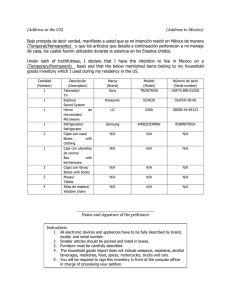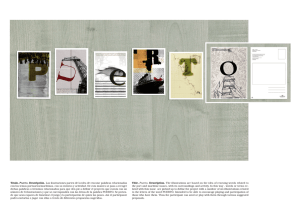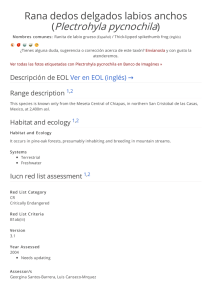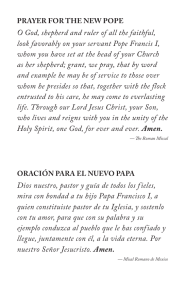SESIÓN 10 PRÁCTICA: LECTURA, ESCRITURA, TRADUCCIÓN
Anuncio
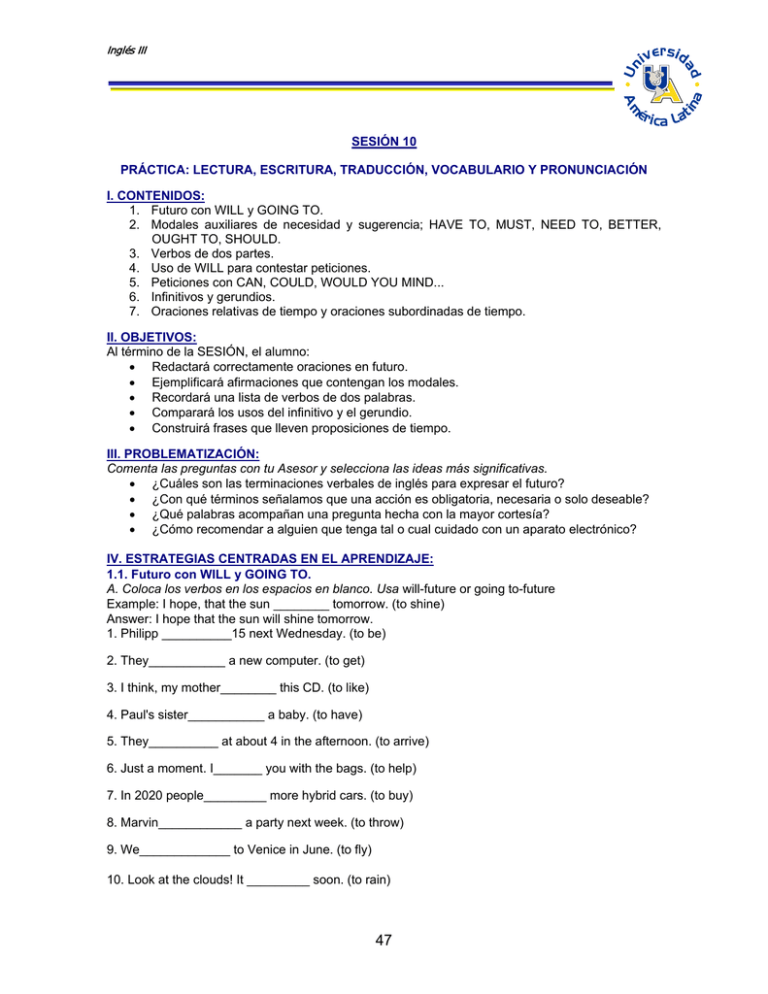
Inglés III SESIÓN 10 PRÁCTICA: LECTURA, ESCRITURA, TRADUCCIÓN, VOCABULARIO Y PRONUNCIACIÓN I. CONTENIDOS: 1. Futuro con WILL y GOING TO. 2. Modales auxiliares de necesidad y sugerencia; HAVE TO, MUST, NEED TO, BETTER, OUGHT TO, SHOULD. 3. Verbos de dos partes. 4. Uso de WILL para contestar peticiones. 5. Peticiones con CAN, COULD, WOULD YOU MIND... 6. Infinitivos y gerundios. 7. Oraciones relativas de tiempo y oraciones subordinadas de tiempo. II. OBJETIVOS: Al término de la SESIÓN, el alumno: • Redactará correctamente oraciones en futuro. • Ejemplificará afirmaciones que contengan los modales. • Recordará una lista de verbos de dos palabras. • Comparará los usos del infinitivo y el gerundio. • Construirá frases que lleven proposiciones de tiempo. III. PROBLEMATIZACIÓN: Comenta las preguntas con tu Asesor y selecciona las ideas más significativas. • ¿Cuáles son las terminaciones verbales de inglés para expresar el futuro? • ¿Con qué términos señalamos que una acción es obligatoria, necesaria o solo deseable? • ¿Qué palabras acompañan una pregunta hecha con la mayor cortesía? • ¿Cómo recomendar a alguien que tenga tal o cual cuidado con un aparato electrónico? IV. ESTRATEGIAS CENTRADAS EN EL APRENDIZAJE: 1.1. Futuro con WILL y GOING TO. A. Coloca los verbos en los espacios en blanco. Usa will-future or going to-future Example: I hope, that the sun ________ tomorrow. (to shine) Answer: I hope that the sun will shine tomorrow. 1. Philipp __________15 next Wednesday. (to be) 2. They___________ a new computer. (to get) 3. I think, my mother________ this CD. (to like) 4. Paul's sister___________ a baby. (to have) 5. They__________ at about 4 in the afternoon. (to arrive) 6. Just a moment. I_______ you with the bags. (to help) 7. In 2020 people_________ more hybrid cars. (to buy) 8. Marvin____________ a party next week. (to throw) 9. We_____________ to Venice in June. (to fly) 10. Look at the clouds! It _________ soon. (to rain) 47 Inglés III B. Escribe el verbo en los espacios y construye oraciones negativas con going to-future. Example: She ________________ her bike in the afternoon. (not /to ride) Answer: She is not going to ride her bike in the afternoon or She's not going to ride her bike in the afternoon. 1. They ________ the lunch basket. (not/to pack) 2. I_______ anybody the way. (not/to ask) 3. Rita_______ Jim's book. (not/to borrow) 4. We_________ a T-shirt. (not/to design) 5. I_________ the red button. (not/to click) 6. The girls_______ at the boys. (not/to laugh) 7. Tim___________ Sandra's hair. (not/to pull) 8. Andy and Fred__________ to a song. (not/to mime) 9. You_________ dinner. (not/to prepare) 10. He_________ the hamster in the garden. (not/to keep) 2.1. Modales auxiliares de necesidad y sugerencia; HAVE TO, MUST, NEED TO, BETTER, OUGHT TO, SHOULD. A. Completa las siguientes oraciones usando en los espacios en blanco should / ought to / had better / must Dear Emma, I’m so glad to hear that you decided to go to UCLA! You______be so excited! Since you were also accepted at Columbia University and Princeton, it__________ have been a difficult decision. I had a great experience at UCLA and I think if you follow my advice, you will too. First, you ________ bring enough money to last you the first month; otherwise you won’t have enough! After that, you _________get a job, but if you don’t, you _________ apply for financial aid. I think you ________ focus more on studying than working, so your job________only require you to work a few hours a week. You __________ live on campus the first year. That way, you will get accustomed to life in the USA and college. After that, you ________ move to an apartment, because it will be hard to focus on your studies if you live on campus with new students! Los Angeles has a lot of things to do. The beaches are great, but you _________ bring sunscreen and a hat if you go. The Southern California sun is very strong. You can also visit Beverly Hills and Hollywood. You___________visit Disneyland and Universal Studios. They are very fun! Los Angeles is a relatively safe city, but you_______be careful because like every big city there is crime. You_________carry a cell phone too, just in case you need to call anyone. If there is anything else I can do to help you, just let me know. I know you ________ be very happy about your new life. Best, Anna 48 Inglés III B. Elige la respuesta correcta para cada una de las preguntas: 1. You should take an umbrella. It________rain. Should have to might must 2. Billy: Are you going to the party? Sally: I'm not sure. I _______ go. Have to might don’t have to mustn’t 3. You should take an umbrella. It ________ rain. Might shouldn’t has to must 4. _______ I use your phone? Have to may must should 5. You _________ do your homework on Saturday morning. That way you have the rest of the weekend free. shouldn’t must ought to might 6. It's not obligatory to take a tie. You _______ wear one. Mustn’t shouldn’t have to don’t have to 7. If you go sailing, you _______ wear a life jacket. The sea is very dangerous. Mustn’t should might must 8. Tomorrow's a holiday. We ________ get up early Don’t have to mustn’t have to should 9. You ______ be horrible to your sister. It makes her very sad. Have to mustn’t must shouldn’t 10. Where's the toilet? I _______ go. Mustn’t have to might should 3.1. Verbos de dos partes. A. Lee esta historia acerca de un maestro que dialoga con sus estudiantes. Escribe the correct twopart verb en cada uno de los espacios. Elige uno de los siguientes verbos turn on - turn off - turn up - turn down - take off - take out - put out - put away - hang up - clean up - pick up. Si ves un espacio amplio, escribe las dos partes juntas. Si ves dos líneas pequeñas una parte del verbo va en cada espacio. Example: Turn the TV on or turn on the TV. Teacher: OK class. Time to start. Mary could you__________ the lights? Thanks. OK everyone, _____your books_____, and make sure you_________your cell phones. Hey! No cell phones in class!______them______! Actually, before we start I want to tell you a little story. Every night I go home,_________my suit and throw it on the bed. My wife always says "You'd better ___________your suit or it will get wrinkled. Of course I do what she says, but last night she was really angry. She said "You're so messy. I always have to___________after you. I got all stressed out so I lit a cigarette. My wife said, "_______that_______! Are you crazy? You can't smoke in the house!" Anyway, let's get back to class. Listen to this tape and answer the questions. Student: It's too loud. Can you______it______down please? Teacher: How's that? Student: I can't hear anything. Teacher: OK, I'll______it_______. How's that? Student: Better. Teacher: OK. Woops, I dropped my pen. Oh, it rolled all the way over there. Could you______it ______ please? 49 Inglés III 4.1. Uso de WILL para contestar peticiones. A. Lee atentamente las preguntas y subraya la respuesta correcta. 1. What will you do next year? I finished school. I will finish school. 2. Are you going to work tomorrow? Yes, I am. Yes, He will 3. What are you going to do for Christmas? I'm going to stay home. I stayed home. 4. Where will you go on you holidays? I will go to Berlin. He will go to Berlin. 5. Are you going to call the police? Yes, I was. Yes, I am. 6. Will Steven buy a new house next year? No, he won't. No, he didn't. 7. Are you going to play cards tonight? Yes, we are. Yes, we did. 8. Will you go the party? Yes, we will. Yes, she will. 5.1. Peticiones con CAN, COULD, WOULD YOU MIND... Elije la respuesta más apropiada que exprese la idea manifestada entre paréntesis. 1. ________I speak to Mr. Smith, please? (Formal polite request) Can May Would Would you mind if 2. _________you open the window, please? It's hot in here. (Polite request) Could Couldn't Won't Wouldn't 3. __________buying two loaves of bread on your way home? (Polite request) Could you Will you Would you Would you mind 4. Would you mind if I_________ your dictionary for an hour or so? (Polite request) borrowed will borrow would borrow 5. Would you mind if I ________come to your party? (Asking for permission) didn't won't wouldn't 6. Mrs. Redding, _______lend me two hundred dollars till next week, please? (Polite request) can you could you do you mind would you mind 7. Would you mind ________here? I have a headache. (Polite request) not to smoke not smoke no smoking not smoking 8. Betty, _________help me with this grammar exercise, please? (Informal request) can you can't you won't you do you mind 9. Could I use your cell phone, please? – Sorry, you _________. (Permission not given) can't couldn't mustn't won't 10. Could I stay here for a while? – Yes, you _________. (Permission given) could can will must 50 Inglés III 6.1. Infinitivos y gerundios. A. Completa los espacios de las frases siguientes con la forma correcta del verbo (-ing o infinitivo con ‘to’). Sigue el ejemplo. Tonight I fancy go out to an expensive restaurant and then to a jazz club. (go out) 1. I don’t enjoy _________ computers. (use) 2. The bank manager absolutely refused _________me any money. (lend) 3. Luis has decided _________his Porsche and ________ a Ferrari. (sell / buy) 4. Don’t forget ________me when you get to the hotel. (phone) 5. I love _______in Spain now, but I really miss _________fish and chips out of English newspaper. (live / eat) 6. I gave up _______and ________ alcohol last year. I don’t feel any healthier, just depressed. (smoke / drink) 7. Would you like_________out for a drink with me next Saturday night? (go) 8. I regret ________that job in Nigeria. (not take) 9. Angeles hates _________ in the city. (drive) 10. Why do you keep on __________at me like that? (look) 11. If you happen_________Ruben, tell him I’d like_________ with him. (see / speak) 12. I feel like ____________ shopping and __________ my entire husband’s money! (go / spend) B. Coloca el gerundio o infinito en la oración que corresponda: to tell / to phone; smoking / drinking / having; pushing; to have / to dance; stealing; to correct; to do / to do; not taking; cleaning; to talk. 1. I’ll try______ your writing next lesson. 2. Why do you always forget______ things which are important to me, but you always remember things which are important to you? 3. I regret ______ my camera with me to Thailand. 4. This apartment needs to_______, it’s absolutely disgusting! 5. On the way to the shops this morning I stopped to_______ Mrs. Grimble whose dog died last week. 6. Do you remember_________that car when we were kids? 7. After the ceremony at the church we went on_______ dinner in a restaurant, and then a few of us went on at a club. 8. If the car won’t start, try _________it. 9. If you stop_______, _______ and________sex you don’t live longer, it just feels like it. 10. I regret ________you Mr. Smith that you only have 24 hours more to live. I’m sorry, but I forgot _______ you yesterday! 7.1. Oraciones relativas de tiempo y oraciones subordinadas de tiempo. A. Completa los huecos con una de las siguientes conjunciones/preposiciones y con la forma de participio presente del verbo entre paréntesis: after, before, by, in, on, since, through, while (puedes repetirlas). 1. _______ _______ (turn) down the job offer, she missed out on the opportunity to get a raise. 2. _______ _______ (enter) the office, I realized everybody was staring at me. 3. _______ _______ (come) out of hospital, I have been at the beach every day. 4. _______ _______ (leave) university, I lived and worked in Paris for five years. 5. _______ _______ (take) the lid off, make sure the steamer pot has cooled down. 6. _______ ________ (put) less sugar in your coffee; you can soon begin to lose weight. 7.______ __________ (understand) your problem, I can't do much to help you. 8. ________ _______ (walk) through the tunnel, I hit my head against the low ceiling. 9. _______ ________ (work) with students, she has come to understand their way of thinking. 10. _____ _________ (return) to the car park, she saw her car had disappeared. 51 Inglés III B. Rescribe las frases utilizando las palabras entre paréntesis. Tienes la primera letra de cada frase. 1. On arriving home, I will open the letter. (soon) A ______________________________________ 2. You will be 18 soon. Then you will get a driving license.(when) W _________________________________________________ 3. We will go bankrupt if we don't cut our costs. (unless) W ___________________________________________ 4. You won't leave the room before answering my question. (until) Y _________________________________________________ 5. Take a map with you. You might get lost. (case) T _______________________________________ 6. I will graduate next year. Then I will take a gap year. (after) I ________________________________________________ 7. I will lend you my car only if you bring it back tonight. (condition) I ____________________________________________________ 8. I will travel to India this summer, but first I will read a travel guide. (before) I ___________________________________________________________ 52 Universidad América Latina Av. Cuauhtémoc 188-E Fracc. Magallanes C.P. 39670 Acapulco, Guerrero, México www.ual.edu.mx 2011 Para cualquier comentario o sugerencia relativa a los Servicios, Personal Docente, Administrativo ó Guías de Estudio, favor de comunicarse a los teléfonos: Dirección General: 01 (33) 47-77-71-00 ext. 1000 con Claudia Ley de 10:00 a 16:00 Hrs. Coordinación de Asesores: 01 (33) 47-77-71-00 ext. 1013 con el Lic. Miguel Machuca García de 08:00 a 17:00 Hrs. e-mail: vicerrectoria@ual.edu.mx
